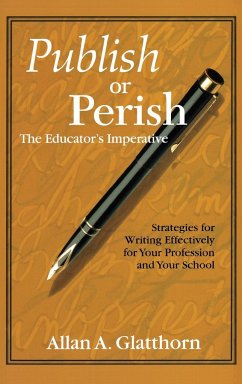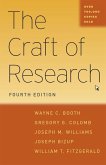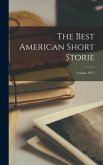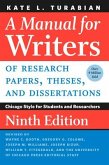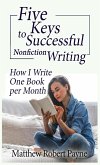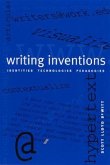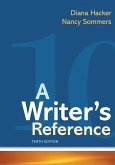Allan A. Glatthorn
Publish or Perish - The Educator's Imperative
Strategies for Writing Effectively for Your Profession and Your School
Allan A. Glatthorn
Publish or Perish - The Educator's Imperative
Strategies for Writing Effectively for Your Profession and Your School
- Gebundenes Buch
- Merkliste
- Auf die Merkliste
- Bewerten Bewerten
- Teilen
- Produkt teilen
- Produkterinnerung
- Produkterinnerung
Glatthorn guides education professionals through the basics of the writing process, empowering them with the tools to create and enhance their own professional submissions and writings.
Andere Kunden interessierten sich auch für
![The Craft of Research The Craft of Research]() Wayne C. BoothThe Craft of Research16,99 €
Wayne C. BoothThe Craft of Research16,99 €![The Best American Short Storie; Volume 1917 The Best American Short Storie; Volume 1917]() AnonymousThe Best American Short Storie; Volume 191745,99 €
AnonymousThe Best American Short Storie; Volume 191745,99 €![Unesco Peace In The Minds Of Men Unesco Peace In The Minds Of Men]() Theodore BestermanUnesco Peace In The Minds Of Men35,99 €
Theodore BestermanUnesco Peace In The Minds Of Men35,99 €![Manual for Writers of Research Papers, Theses, and Dissertations Manual for Writers of Research Papers, Theses, and Dissertations]() Kate L. TurabianManual for Writers of Research Papers, Theses, and Dissertations16,99 €
Kate L. TurabianManual for Writers of Research Papers, Theses, and Dissertations16,99 €![Five Keys to Successful Nonfiction Writing: How I Write One Book per Month Five Keys to Successful Nonfiction Writing: How I Write One Book per Month]() Matthew Robert PayneFive Keys to Successful Nonfiction Writing: How I Write One Book per Month25,99 €
Matthew Robert PayneFive Keys to Successful Nonfiction Writing: How I Write One Book per Month25,99 €![Writing Inventions Writing Inventions]() Scott Lloyd DewittWriting Inventions109,99 €
Scott Lloyd DewittWriting Inventions109,99 €![A Writer's Reference A Writer's Reference]() Diana HackerA Writer's Reference62,99 €
Diana HackerA Writer's Reference62,99 €-
-
-
Glatthorn guides education professionals through the basics of the writing process, empowering them with the tools to create and enhance their own professional submissions and writings.
Hinweis: Dieser Artikel kann nur an eine deutsche Lieferadresse ausgeliefert werden.
Hinweis: Dieser Artikel kann nur an eine deutsche Lieferadresse ausgeliefert werden.
Produktdetails
- Produktdetails
- Verlag: Corwin
- Seitenzahl: 256
- Erscheinungstermin: 12. März 2002
- Englisch
- Abmessung: 235mm x 157mm x 18mm
- Gewicht: 526g
- ISBN-13: 9780761978664
- ISBN-10: 0761978666
- Artikelnr.: 22231274
- Herstellerkennzeichnung
- Libri GmbH
- Europaallee 1
- 36244 Bad Hersfeld
- gpsr@libri.de
- Verlag: Corwin
- Seitenzahl: 256
- Erscheinungstermin: 12. März 2002
- Englisch
- Abmessung: 235mm x 157mm x 18mm
- Gewicht: 526g
- ISBN-13: 9780761978664
- ISBN-10: 0761978666
- Artikelnr.: 22231274
- Herstellerkennzeichnung
- Libri GmbH
- Europaallee 1
- 36244 Bad Hersfeld
- gpsr@libri.de
Allan A. Glatthorn (1924-2007) was a major contributor to the third and fourth editions; his research used in the preparation of the first and second editions of Writing the Winning Thesis or Dissertation: A Step-by-Step Guide was the foundation for the third edition. He was the Distinguished Research Professor of Education (Emeritus) in the College of Education of East Carolina University, where he advised doctoral students, chaired dissertations, and taught courses in supervision and curriculum. He was formerly Professor of Education at the Graduate School of Education of the University of Pennsylvania. Prior to his university assignments, he was a high school teacher and principal. In his work as a professor, he chaired close to 100 dissertations. He is the author of numerous professional books, several of which have been published by Corwin.
Preface Acknowledgments About the Author Part I: Getting Started 1. Becoming a Published Writing Professional The Reasons for Writing and Publishing The Drawbacks of Writing Learning to Write The Organization of This Work 2. Focusing and Planning for the Long Term Finding a Focus A Rationale for Finding a Focus Making the Long-Term Plan Complete the Writing Life Stream Complete the Research Life Stream A Final Note 3. Using the Tools of the Writer
s Craft Books and Journals A Writer
s Notebook Computer, Printer, and Word Processing Software Other Uses of the Technology Other Hardware A Final Note Part II: Mastering the Writing Process 4. Finding a Topic Write About What You Know Study Professional Journals Use the Focus Finder Go Against the Grain Find a Problem 5. Building the Knowledge Base Make Preparations Use a Comprehensive Retrieval Process Continue to Update Your Files 6. Organizing Your Writing The Nature of Reader-Centered Organization Identify Type of Writing and the Audience Review the Literature Make Visual Presentations Make Your Organization Known to Your Reader 7. Writing the First Draft Get Ready to Write Listen to Your Writing Be Aware of Paragraph Length and Topic Sentences as You Write Integrate the Knowledge Base Focus on Results 8. Revising and Editing Knowing When to Revise and Edit Getting Help in Revising and Editing Revising Effectively Editing Carefully 9. Publishing: Working With Editors and Publishers Choosing the Right Venue Choosing a Publisher Understanding the Publishing Process Knowing the People in the Process Working With Editors Writing the Query Letter Developing the Proposal Signing Contracts Publishing in Journals A Concluding Note Part III: Writing for the Profession 10. Writing for Practitioners
Journals Study and Select the Journal Decide About a Query Letter Build the Knowledge Base Write and Effective Introduction Understand the Types of Practitioner Articles Take Care of the Final Details A Concluding Note 11. Writing for Research Journals Take Care of Preliminary Matters Follow General Guidelines Write the Abstract Write the Introduction Review of the Literature Explain the Methodology Report the Results Summarize and Discuss the Results A Concluding Note 12. Writing the Opinion Piece Handling Preliminary Matters Writing the Introduction Stating Your Arguments Writing the Rebuttal Writing the Conclusion Revising as Necessary A Concluding Note 13. Writing the Big Book Getting Ready to Write Writing the Big Book Writing the Front Matter Writing the Remaining Chapters Taking Care of Final Matters Revising and Preparing for Submission Promoting the Published Book 14. Using the Internet Learning From the Internet Seeking Funding Communicating With Others Publishing on the Internet Part IV: Writing in Academic Settings 15. Writing the Review of the Literature Planning the Review Writing the First Draft of the Review Meeting Requirements of Special Uses 16. Responding to Your Reading Before You Read Read Appreciatively and Critically Write Your Response 17. Mastering the Academic Style: Research Proposal, Thesis, and Dissertation Writing the Academic Style: Organization Making the Organization Clear Choosing the Right Words Mastering Sentences Mastering the Paragraph Some Final Reminders Part V: Writing in the Organization 18. Publishing in the Local Paper - Sharon Schlegel and Allan Glatthorn Cultivating Local Sources Establishing Contact Writing the News Release Writing Letters to the Editor Writing Feature Articles Working With a Reporter or Journalist Writing the Feature Yourself Writing a Column 19. Writing Successful Proposals for Funding Before You Start Writing Writing the Proposal Resources Part VI: Conclusion 20. A Look Behind and A Look Ahead A Look Behind A Look Ahead Index
s Craft Books and Journals A Writer
s Notebook Computer, Printer, and Word Processing Software Other Uses of the Technology Other Hardware A Final Note Part II: Mastering the Writing Process 4. Finding a Topic Write About What You Know Study Professional Journals Use the Focus Finder Go Against the Grain Find a Problem 5. Building the Knowledge Base Make Preparations Use a Comprehensive Retrieval Process Continue to Update Your Files 6. Organizing Your Writing The Nature of Reader-Centered Organization Identify Type of Writing and the Audience Review the Literature Make Visual Presentations Make Your Organization Known to Your Reader 7. Writing the First Draft Get Ready to Write Listen to Your Writing Be Aware of Paragraph Length and Topic Sentences as You Write Integrate the Knowledge Base Focus on Results 8. Revising and Editing Knowing When to Revise and Edit Getting Help in Revising and Editing Revising Effectively Editing Carefully 9. Publishing: Working With Editors and Publishers Choosing the Right Venue Choosing a Publisher Understanding the Publishing Process Knowing the People in the Process Working With Editors Writing the Query Letter Developing the Proposal Signing Contracts Publishing in Journals A Concluding Note Part III: Writing for the Profession 10. Writing for Practitioners
Journals Study and Select the Journal Decide About a Query Letter Build the Knowledge Base Write and Effective Introduction Understand the Types of Practitioner Articles Take Care of the Final Details A Concluding Note 11. Writing for Research Journals Take Care of Preliminary Matters Follow General Guidelines Write the Abstract Write the Introduction Review of the Literature Explain the Methodology Report the Results Summarize and Discuss the Results A Concluding Note 12. Writing the Opinion Piece Handling Preliminary Matters Writing the Introduction Stating Your Arguments Writing the Rebuttal Writing the Conclusion Revising as Necessary A Concluding Note 13. Writing the Big Book Getting Ready to Write Writing the Big Book Writing the Front Matter Writing the Remaining Chapters Taking Care of Final Matters Revising and Preparing for Submission Promoting the Published Book 14. Using the Internet Learning From the Internet Seeking Funding Communicating With Others Publishing on the Internet Part IV: Writing in Academic Settings 15. Writing the Review of the Literature Planning the Review Writing the First Draft of the Review Meeting Requirements of Special Uses 16. Responding to Your Reading Before You Read Read Appreciatively and Critically Write Your Response 17. Mastering the Academic Style: Research Proposal, Thesis, and Dissertation Writing the Academic Style: Organization Making the Organization Clear Choosing the Right Words Mastering Sentences Mastering the Paragraph Some Final Reminders Part V: Writing in the Organization 18. Publishing in the Local Paper - Sharon Schlegel and Allan Glatthorn Cultivating Local Sources Establishing Contact Writing the News Release Writing Letters to the Editor Writing Feature Articles Working With a Reporter or Journalist Writing the Feature Yourself Writing a Column 19. Writing Successful Proposals for Funding Before You Start Writing Writing the Proposal Resources Part VI: Conclusion 20. A Look Behind and A Look Ahead A Look Behind A Look Ahead Index
Preface Acknowledgments About the Author Part I: Getting Started 1. Becoming a Published Writing Professional The Reasons for Writing and Publishing The Drawbacks of Writing Learning to Write The Organization of This Work 2. Focusing and Planning for the Long Term Finding a Focus A Rationale for Finding a Focus Making the Long-Term Plan Complete the Writing Life Stream Complete the Research Life Stream A Final Note 3. Using the Tools of the Writer
s Craft Books and Journals A Writer
s Notebook Computer, Printer, and Word Processing Software Other Uses of the Technology Other Hardware A Final Note Part II: Mastering the Writing Process 4. Finding a Topic Write About What You Know Study Professional Journals Use the Focus Finder Go Against the Grain Find a Problem 5. Building the Knowledge Base Make Preparations Use a Comprehensive Retrieval Process Continue to Update Your Files 6. Organizing Your Writing The Nature of Reader-Centered Organization Identify Type of Writing and the Audience Review the Literature Make Visual Presentations Make Your Organization Known to Your Reader 7. Writing the First Draft Get Ready to Write Listen to Your Writing Be Aware of Paragraph Length and Topic Sentences as You Write Integrate the Knowledge Base Focus on Results 8. Revising and Editing Knowing When to Revise and Edit Getting Help in Revising and Editing Revising Effectively Editing Carefully 9. Publishing: Working With Editors and Publishers Choosing the Right Venue Choosing a Publisher Understanding the Publishing Process Knowing the People in the Process Working With Editors Writing the Query Letter Developing the Proposal Signing Contracts Publishing in Journals A Concluding Note Part III: Writing for the Profession 10. Writing for Practitioners
Journals Study and Select the Journal Decide About a Query Letter Build the Knowledge Base Write and Effective Introduction Understand the Types of Practitioner Articles Take Care of the Final Details A Concluding Note 11. Writing for Research Journals Take Care of Preliminary Matters Follow General Guidelines Write the Abstract Write the Introduction Review of the Literature Explain the Methodology Report the Results Summarize and Discuss the Results A Concluding Note 12. Writing the Opinion Piece Handling Preliminary Matters Writing the Introduction Stating Your Arguments Writing the Rebuttal Writing the Conclusion Revising as Necessary A Concluding Note 13. Writing the Big Book Getting Ready to Write Writing the Big Book Writing the Front Matter Writing the Remaining Chapters Taking Care of Final Matters Revising and Preparing for Submission Promoting the Published Book 14. Using the Internet Learning From the Internet Seeking Funding Communicating With Others Publishing on the Internet Part IV: Writing in Academic Settings 15. Writing the Review of the Literature Planning the Review Writing the First Draft of the Review Meeting Requirements of Special Uses 16. Responding to Your Reading Before You Read Read Appreciatively and Critically Write Your Response 17. Mastering the Academic Style: Research Proposal, Thesis, and Dissertation Writing the Academic Style: Organization Making the Organization Clear Choosing the Right Words Mastering Sentences Mastering the Paragraph Some Final Reminders Part V: Writing in the Organization 18. Publishing in the Local Paper - Sharon Schlegel and Allan Glatthorn Cultivating Local Sources Establishing Contact Writing the News Release Writing Letters to the Editor Writing Feature Articles Working With a Reporter or Journalist Writing the Feature Yourself Writing a Column 19. Writing Successful Proposals for Funding Before You Start Writing Writing the Proposal Resources Part VI: Conclusion 20. A Look Behind and A Look Ahead A Look Behind A Look Ahead Index
s Craft Books and Journals A Writer
s Notebook Computer, Printer, and Word Processing Software Other Uses of the Technology Other Hardware A Final Note Part II: Mastering the Writing Process 4. Finding a Topic Write About What You Know Study Professional Journals Use the Focus Finder Go Against the Grain Find a Problem 5. Building the Knowledge Base Make Preparations Use a Comprehensive Retrieval Process Continue to Update Your Files 6. Organizing Your Writing The Nature of Reader-Centered Organization Identify Type of Writing and the Audience Review the Literature Make Visual Presentations Make Your Organization Known to Your Reader 7. Writing the First Draft Get Ready to Write Listen to Your Writing Be Aware of Paragraph Length and Topic Sentences as You Write Integrate the Knowledge Base Focus on Results 8. Revising and Editing Knowing When to Revise and Edit Getting Help in Revising and Editing Revising Effectively Editing Carefully 9. Publishing: Working With Editors and Publishers Choosing the Right Venue Choosing a Publisher Understanding the Publishing Process Knowing the People in the Process Working With Editors Writing the Query Letter Developing the Proposal Signing Contracts Publishing in Journals A Concluding Note Part III: Writing for the Profession 10. Writing for Practitioners
Journals Study and Select the Journal Decide About a Query Letter Build the Knowledge Base Write and Effective Introduction Understand the Types of Practitioner Articles Take Care of the Final Details A Concluding Note 11. Writing for Research Journals Take Care of Preliminary Matters Follow General Guidelines Write the Abstract Write the Introduction Review of the Literature Explain the Methodology Report the Results Summarize and Discuss the Results A Concluding Note 12. Writing the Opinion Piece Handling Preliminary Matters Writing the Introduction Stating Your Arguments Writing the Rebuttal Writing the Conclusion Revising as Necessary A Concluding Note 13. Writing the Big Book Getting Ready to Write Writing the Big Book Writing the Front Matter Writing the Remaining Chapters Taking Care of Final Matters Revising and Preparing for Submission Promoting the Published Book 14. Using the Internet Learning From the Internet Seeking Funding Communicating With Others Publishing on the Internet Part IV: Writing in Academic Settings 15. Writing the Review of the Literature Planning the Review Writing the First Draft of the Review Meeting Requirements of Special Uses 16. Responding to Your Reading Before You Read Read Appreciatively and Critically Write Your Response 17. Mastering the Academic Style: Research Proposal, Thesis, and Dissertation Writing the Academic Style: Organization Making the Organization Clear Choosing the Right Words Mastering Sentences Mastering the Paragraph Some Final Reminders Part V: Writing in the Organization 18. Publishing in the Local Paper - Sharon Schlegel and Allan Glatthorn Cultivating Local Sources Establishing Contact Writing the News Release Writing Letters to the Editor Writing Feature Articles Working With a Reporter or Journalist Writing the Feature Yourself Writing a Column 19. Writing Successful Proposals for Funding Before You Start Writing Writing the Proposal Resources Part VI: Conclusion 20. A Look Behind and A Look Ahead A Look Behind A Look Ahead Index

